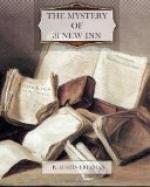I tried to attack the validity of the will from various directions, and failed every time. As to its genuineness, that was obviously not in question. There seemed to me only two conceivable respects in which any objection could be raised, viz. the competency of Jeffrey to execute a will and the possibility of undue influence having been brought to bear on him.
With reference to the first, there was the undoubted fact that Jeffrey was addicted to the opium habit, and this might, under some circumstances, interfere with a testator’s competency to make a will. But had any such circumstances existed in this case? Had the drug habit produced such mental changes in the deceased as would destroy or weaken his judgment? There was not a particle of evidence in favour of any such belief. Up to the very end he had managed his own affairs, and, if his habits of life had undergone a change, they were still the habits of a perfectly sane and responsible man.
The question of undue influence was more difficult. If it applied to any person in particular, that person could be none other than John Blackmore. Now it was an undoubted fact that, of all Jeffrey’s acquaintance, his brother John was the only one who knew that he was in residence at New Inn. Moreover John had visited him there more than once. It was therefore possible that influence might have been brought to bear on the deceased. But there was no evidence that it had. The fact that the deceased man’s only brother should be the one person who knew where he was living was not a remarkable one, and it had been satisfactorily explained by the necessity of Jeffrey’s finding a reference on applying for the chambers. And against the theory of undue influence was the fact that the testator had voluntarily brought his will to the lodge and executed it in the presence of entirely disinterested witnesses.
In the end I had to give up the problem in despair, and, abandoning the documents, turned my attention to the facts elicited by our visit to New Inn.
What had we learned from our exploration? It was clear that Thorndyke had picked up some facts that had appeared to him important. But important in what respect? The only possible issue that could be raised was the validity or otherwise of Jeffrey Blackmore’s will; and since the validity of that will was supported by positive evidence of the most incontestable kind, it seemed that nothing that we had observed could have any real bearing on the case at all.
But this, of course, could not be. Thorndyke was no dreamer nor was he addicted to wild speculation. If the facts observed by us seemed to him to be relevant to the case, I was prepared to assume that they were relevant, although I could not see their connection with it. And, on this assumption, I proceeded to examine them afresh.
Now, whatever Thorndyke might have observed on his own account, I had brought away from the dead man’s chambers only a single fact; and a very extraordinary fact it was. The cuneiform inscription was upside down. That was the sum of the evidence that I had collected; and the question was, What did it prove? To Thorndyke it conveyed some deep significance. What could that significance be?




